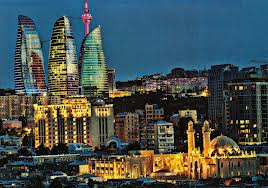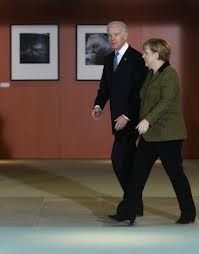Azerbaijan Is Rich. Now It Wants to Be Famous.
11/02/2013 3 comentarios
 (…..) Few countries have come as far in mastering the art of geopolitics as Azerbaijan. After being occupied by Cyrus the Great, Alexander the Great, the Seljuks, Mongols, Persians, the Russians, the Ottomans and, finally, Soviets, Azerbaijan, which achieved its independence in 1991, has cultivated few relationships with US, many European countries, deepened relations with Russia and key Central Asian “stans”. These days, Azerbaijan, which is overwhelmingly Muslim, buys advanced weapons systems from Israel in return for oil. A new member of United Nations Security Council, the country sided with the United States against Russia last year on a resolution condemning Syria. “This is a very small country on a very significant piece of real estate,” says Matthew Bryza, former U.S. ambassador to Azerbaijan. “Azerbaijan pursues a very realpolitik policy.” In the old days, they came for geography (Azerbaijan is perched on Caspian). About century ago, they started coming for oil. Then, after Soviet Union collapsed, energy sector became a source of enormous wealth. Now Azerbaijan is trying to take an advantage of that wealth. As such, Avesta’s sales and marketing team recently produced a gleaming 101-page coffee-table book in a gilded box promoting Khazar Islands. It features photographs of men in Italian suits, women with pouty faces; everyone drinks wine and is on a cigarette boat or in a Mercedes convertible. There’s also a video that shows computer renderings of Khazar Islands in not-too-distant future. The video lasts 5 minutes 6 seconds and includes an image of a make-believe skyline at night and another of Ibrahimov on a cellphone in front of a private jet, even though, conceded, he doesn’t own one. 2 things about the video are striking. First, there isn’t any information about asking prices, square footage, move-in dates, why anyone would want to live in Baku. And then there’s the soundtrack, which is a synthesized blast of violins, harps, horns and snare drums that makes you feel as if you’re riding a stallion in the desert in the 1980s. The day before my three-hour flight from Moscow to Baku last spring, Avesta’s sales and marketing director at the time, Kenan Guluzade, flew to the Russian capital to hand-deliver book and DVD to me at a Starbucks. Guluzade said he had to be in Russia anyway, he was also worried that, as a journalist, I might not get into Azerbaijan. Guluzade came with his assistant and his father, who sported an elegant, silk scarf and a tailored jacket. Guluzade spoke quickly, in English. “It’s really nice to feel attention to our construction project,” he said, and then he handed me a fancy shopping bag with the DVD and the book. His father sipped a latte. “The new Baku is stunning,” his father said. Then Guluzade said: “This is true. It’s amazing what is happening.” When I arrived in Baku, first of the Khazar Islands had already been plunked down, and first few apartment buildings were going up. The entrance featured a menacing, falconlike archway. Boulevards and traffic circles had been paved, and there were long strips of palm trees, “Ibrahimov loves palm trees,” Nigar Huseynli, Ibrahimov’s assistant, said, and everywhere there seemed to be mounds of earth and retaining walls and the concrete outlines of future cineplexes and shopping malls. Amrahov Hasrat, who was chief engineer at the Khazar Islands, told me that 200 trucks brought in rocks every day from a bluff eight miles away. “We are destroying the mountain,” Hasrat said, pointing off into the distance in the direction of a hill, “and taking the rocks back to the sea to build the artificial islands” (…..)
(…..) Few countries have come as far in mastering the art of geopolitics as Azerbaijan. After being occupied by Cyrus the Great, Alexander the Great, the Seljuks, Mongols, Persians, the Russians, the Ottomans and, finally, Soviets, Azerbaijan, which achieved its independence in 1991, has cultivated few relationships with US, many European countries, deepened relations with Russia and key Central Asian “stans”. These days, Azerbaijan, which is overwhelmingly Muslim, buys advanced weapons systems from Israel in return for oil. A new member of United Nations Security Council, the country sided with the United States against Russia last year on a resolution condemning Syria. “This is a very small country on a very significant piece of real estate,” says Matthew Bryza, former U.S. ambassador to Azerbaijan. “Azerbaijan pursues a very realpolitik policy.” In the old days, they came for geography (Azerbaijan is perched on Caspian). About century ago, they started coming for oil. Then, after Soviet Union collapsed, energy sector became a source of enormous wealth. Now Azerbaijan is trying to take an advantage of that wealth. As such, Avesta’s sales and marketing team recently produced a gleaming 101-page coffee-table book in a gilded box promoting Khazar Islands. It features photographs of men in Italian suits, women with pouty faces; everyone drinks wine and is on a cigarette boat or in a Mercedes convertible. There’s also a video that shows computer renderings of Khazar Islands in not-too-distant future. The video lasts 5 minutes 6 seconds and includes an image of a make-believe skyline at night and another of Ibrahimov on a cellphone in front of a private jet, even though, conceded, he doesn’t own one. 2 things about the video are striking. First, there isn’t any information about asking prices, square footage, move-in dates, why anyone would want to live in Baku. And then there’s the soundtrack, which is a synthesized blast of violins, harps, horns and snare drums that makes you feel as if you’re riding a stallion in the desert in the 1980s. The day before my three-hour flight from Moscow to Baku last spring, Avesta’s sales and marketing director at the time, Kenan Guluzade, flew to the Russian capital to hand-deliver book and DVD to me at a Starbucks. Guluzade said he had to be in Russia anyway, he was also worried that, as a journalist, I might not get into Azerbaijan. Guluzade came with his assistant and his father, who sported an elegant, silk scarf and a tailored jacket. Guluzade spoke quickly, in English. “It’s really nice to feel attention to our construction project,” he said, and then he handed me a fancy shopping bag with the DVD and the book. His father sipped a latte. “The new Baku is stunning,” his father said. Then Guluzade said: “This is true. It’s amazing what is happening.” When I arrived in Baku, first of the Khazar Islands had already been plunked down, and first few apartment buildings were going up. The entrance featured a menacing, falconlike archway. Boulevards and traffic circles had been paved, and there were long strips of palm trees, “Ibrahimov loves palm trees,” Nigar Huseynli, Ibrahimov’s assistant, said, and everywhere there seemed to be mounds of earth and retaining walls and the concrete outlines of future cineplexes and shopping malls. Amrahov Hasrat, who was chief engineer at the Khazar Islands, told me that 200 trucks brought in rocks every day from a bluff eight miles away. “We are destroying the mountain,” Hasrat said, pointing off into the distance in the direction of a hill, “and taking the rocks back to the sea to build the artificial islands” (…..)
Link: http://www.nytimes.com/2013/02/10/magazine/azerbaijan-is-rich-now-it-wants-to-be-famous.html

